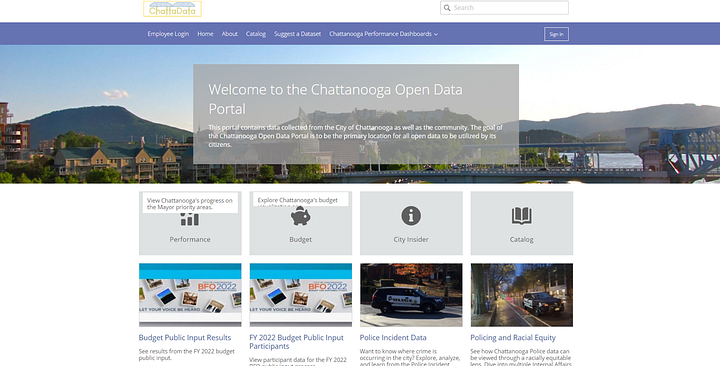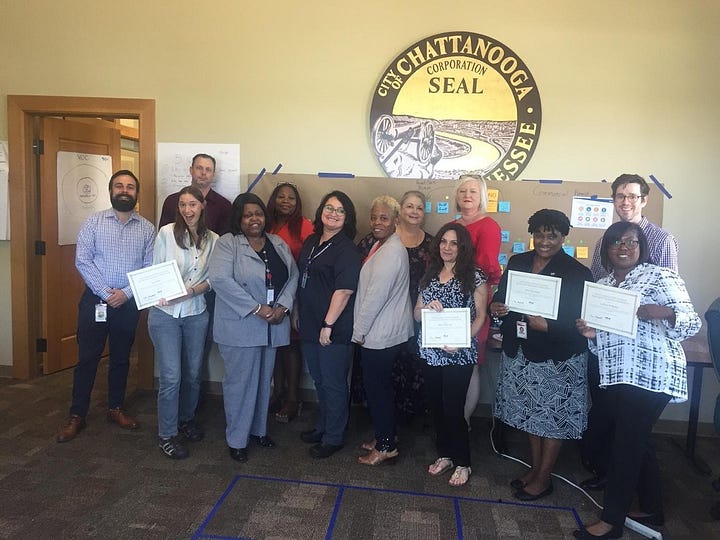Chattanooga, Tennessee, USA
Chattanooga’s Data-Driven Mission to End Veteran Homelessness.
Project Type:
Equity, Finance, High Performing Government, Homelessness
At a Glance
Used data to more efficiently and quickly address the veteran housing crisis by understanding the size and scope of the problem, coordinating with city officials, and measuring their impact.
Chattanooga’s Police Data Initiative analyzed arrests, traffic citations, 911 calls, and use of force, and created a Police Equity Dashboard to implement more equitable practices.
Residents can access performance dashboards and keep tabs on everything from infrastructure issues to the average length of traffic jams via open data platform ChattaData.org.
Affordable Housing in Chattanooga
2014 was a decisive year for the city of Chattanooga. Then-Mayor Andy Berke set the ambitious goal of housing all of the city’s homeless veterans by the end of 2016, creating a special task force and signing on to the Mayors Challenge to End Veteran Homelessness.
“We met that goal by the hair of our chin,” says Tyler Yount, the City’s former director of special projects, who served as head of the mayor’s task force composed of city officials, homeless service providers, community leaders, and veterans.
How did they house every veteran? In Chattanooga, a city of about 180,000 people located along the Tennessee River, the task force took a data-driven approach. First, it canvassed the city to track down every homeless veteran — they found a total of 184 individuals. Next they mapped and analyzed every step involved with housing veterans, looking to streamline and improve the process. Then they began holding weekly meetings with case managers and officials at city agencies that addressed homelessness in order to share and implement ideas. It was an iterative and at times painstaking process, but it moved the needle in the right direction.
Tracking progress toward housing the City’s homeless veterans was supported by a dashboard detailing the status of time-bound, measurable goals. The task force created it in partnership with Chattanooga’s Office of Performance Management and Open Data (OPMOD). The office has been at the center of the City’s years-long commitment, supported by What Works Cities (WWC), to build a data-driven culture that prizes transparency, accountability, and evidence-based evaluations of programs and policies. All this prior investment and work has built a strong foundation for the task force’s success.
The mayor liked the task force’s dashboard so much that he tracked it on his smartphone — which helped the task force stay focused on success. “Having support from the top for our data-driven approach mattered,” Yount says. One major problem the team discovered while sifting through data: Some veterans with housing vouchers had difficulty finding a place to live and signing a lease within the 90 days required by the Chattanooga Housing Authority (CHA). Vouchers would expire after that point, forcing homeless veterans to start the city’s housing assistance process over again. At the task force’s request, the City hired housing navigation assistants to help veterans secure housing. The result: People were able to be housed weeks — even months — faster than they would have without targeted support.
Another successful process improvement involved CHA paperwork. The task force worked with the agency to expedite processing of required paperwork by weeks. “Lots of small tweaks like that saved us three weeks here, five days there,” Yount says. “There was no magic wand — we just had to chip away at the problem and try to make the housing process better and easier for veterans.”
When the task force began its work in Spring 2014, the average time it took to get homeless veterans into housing was close to 300 days. By the end of 2016, it shrank to about 60 days. By then, the city had achieved “functional zero” when it came to homeless veterans. This metric, developed by the national advocacy organization Community Solutions, means the number of veterans experiencing homelessness in Chattanooga is less than the number of veterans it has proven it can house within a month. To reach this milestone, a community must first gather quality data on every homeless veteran and update it at least monthly to ensure that when a veteran does become homeless, the ordeal is brief.
“We would try different solutions and then look at the data that month to see if it got people moving into housing faster.”
Building a City-Wide Learning Culture
The City has scaled up similar data-driven techniques to address homelessness as a whole in Chattanooga while also making data-driven governance and innovation the norm across other realms. OPMOD, which launched in 2014, works to harness data and use specific performance metrics to support projects that can improve the lives of residents in areas like economic growth and public safety.
For example, OPMOD staff has helped with Chattanooga’s Police Data Initiative. The team analyzed arrests, traffic citations, 911 calls, and use of force, and created a Police Equity Dashboard to break down the data. The process revealed that Chattanooga’s nonwhite residents were disproportionately cited for driving without insurance or with an expired registration. The city is now working on how to better help minority populations with vehicle upkeep.
“Our approach to data in the city is very mission-driven. We don’t do data for data’s sake. We’re very purposeful in why and how we use data. And we’ve tried to create a learning culture built around it.”

To that end, Chattanooga began holding monthly data-driven performance meetings called ChattaData in which the heads of city agencies team with OPMOD’s three data experts to crunch numbers and tackle big issues. The City also created an open data platform, ChattaData.org, so that residents can view performance dashboards to keep tabs on everything from property crimes to the average length of traffic jams. (Technical assistance received from Johns Hopkins University’s Center for Government Excellence, a WWC expert partner, in part focused on open data practices, including automating the flow of data to the platform to increase access to real-time data and better respond to resident requests.)
Chattanooga also embraced budgeting for outcomes, an approach that involves specifying outcomes the city hopes to achieve through the annual budgetary process, creating plans for how to achieve them, and then using data to measure progress. And in 2017, Chattanooga launched the Peak Academy, which trains city employees to use data to drive innovation. Moreland estimates that about 200 people from various city departments have attended the intensive five-day “black belt” training program, which is based on a successful program in Denver, Colorado. The expectation is that each attendee returns to their regular duties ready to implement three innovation ideas that can improve work processes and the delivery of city services to residents.

Even small, relatively simple innovations can have big impacts over time, Moreland says, while building “connective tissue between city staff and between staff and residents,” he says.
“That’s one thing that’s really special about Chattanooga and the culture we’ve created around data-driven work in the city. It’s very collaborative, it’s very open, and at heart it’s about service, making the city a better place.”